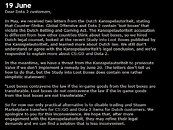- Joined
- May 14, 2004
- Messages
- 27,988 (3.71/day)
| Processor | Ryzen 7 5700X |
|---|---|
| Memory | 48 GB |
| Video Card(s) | RTX 4080 |
| Storage | 2x HDD RAID 1, 3x M.2 NVMe |
| Display(s) | 30" 2560x1600 + 19" 1280x1024 |
| Software | Windows 10 64-bit |
Not long ago, the Netherlands ruled that loot boxes in games are gambling, and have been designed to get people addicted, in order to spend more money. Gaming companies had until June 20 (yesterday) to either change their game mechanics accordingly or to apply for a gambling license.
This has now caused Valve to disable trading of items on CS:GO and Dota 2, as the current interpretation of the law has a little loophole that considers loot boxes as gambling only, when the in-game goods are transferable between players.


While other countries sit on their asses and barely debate this topic, the Netherlands seem to be the only country that acts, to stop this madness. Valve of course claims that they are unfairly treated and promise to explain their games' concepts to the Dutch Gambling Authority in hopes to get a more favorable ruling. Also Valve's solution kinda drives people to loot boxes even more, since you can no longer buy the specific item you want from another player; you now have to go through loot boxes, praying that the random number generator will grant you what you're looking for. On the other hand it discourages people from spending excessive money in hopes they can find a high-ticket item that they can sell for a big profit.
The Dutch Gambling Authority has plans to separate regular games and games of chance more strictly, especially to protect younger gamers from the risks of addition. Gambling licenses will only be given to non-EU companies if they have a branch office in the Netherlands and appoint an addiction prevention representative. Also a fund will be established for addiction research, treatment and prevention, into which gaming providers have to pay 0.25% of their gross gaming revenue. Companies not in compliance with the law can be fined up to € 830,000 or 10% of their world-wide revenue.
View at TechPowerUp Main Site
This has now caused Valve to disable trading of items on CS:GO and Dota 2, as the current interpretation of the law has a little loophole that considers loot boxes as gambling only, when the in-game goods are transferable between players.


While other countries sit on their asses and barely debate this topic, the Netherlands seem to be the only country that acts, to stop this madness. Valve of course claims that they are unfairly treated and promise to explain their games' concepts to the Dutch Gambling Authority in hopes to get a more favorable ruling. Also Valve's solution kinda drives people to loot boxes even more, since you can no longer buy the specific item you want from another player; you now have to go through loot boxes, praying that the random number generator will grant you what you're looking for. On the other hand it discourages people from spending excessive money in hopes they can find a high-ticket item that they can sell for a big profit.
The Dutch Gambling Authority has plans to separate regular games and games of chance more strictly, especially to protect younger gamers from the risks of addition. Gambling licenses will only be given to non-EU companies if they have a branch office in the Netherlands and appoint an addiction prevention representative. Also a fund will be established for addiction research, treatment and prevention, into which gaming providers have to pay 0.25% of their gross gaming revenue. Companies not in compliance with the law can be fined up to € 830,000 or 10% of their world-wide revenue.
View at TechPowerUp Main Site




